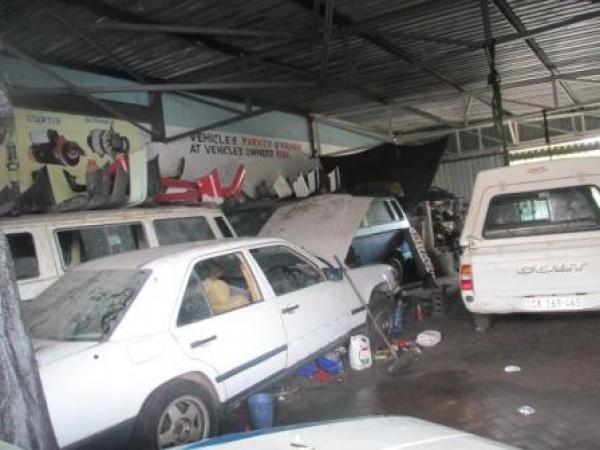

Nzazi says three months is not long enough to relocate his business to Angola.
25 September 2013
Petro Nzazi (not his real name) and his young brother are refugees from Angola. They have lost their refugee status, and they are now left without any identity documents.
Nzazi, 52 and living in Grassy Park, came to South Africa with his wife and two children in 1998. His wife runs a hairdressing salon in Capricorn. The eldest child, 10-years-old then, is now 25. They had three more children in South Africa.
The Nzazi brothers are orphans; their parents died when Petro was six and his younger brother only a few months old. Since they left 22 years ago, they have never been to Angola.
The younger brother (46) arrived first in South Africa in 1994 and established a motor mechanic business. He is married to an Angolan woman and has two children. His refugee status expired on the 1 August 2013.
For most transactions in his business, he needs his identity card. His First National Bank account was frozen when the document expired. His clients are not willing to do cash transactions especially when large amounts are involved.
His only option it seems is to uproot his business within a short period of time.
In October 2009, the United Nation High Commissioner for Refugees (UNHCR) proposed to end refugee status for Angolans who fled the civil war which ended in 2002. It recommended member states act in concert to achieve a uniform schedule for the implementation of the cessation of the refugee dispensation.
According to the South African Foreign Policy Initiative (SAFPI) website, Home Affairs Deputy Minister Fatima Chohan said that a special dispensation was offered to Angolan nationals to regularize their stay in South Africa over a 14 week period ending 31 August 2013.
Nzazi says at a 31 August meeting at the Cape Town Refugee Office between Deputy Home Affairs Minister Fatima Chohan and a group of Angolan refugees, Chohan told them that her department would not be extending any statuses, and that once their passports arrived, they would be required to leave South Africa within two weeks and apply for immigration permits at the South African embassy in Angola. Those who did not comply would be repatriated and denied re-entry into South Africa.
Nzazi says the time they were given was too short. “More than 2000 people applied for passports the same time as me and my family (in July) … Since the process started I have never seen anyone who testified that his or her passport was processed.”
As a result of his situation he has developed high blood pressure and is on medication. He is worried about his family’s future; he cannot sleep at night. He does not know what to tell his children.
“What is going to become of my children who cannot speak my language, but only English, their first language. Why can they not legalise us and let my children continue with their education here?”
“Yes, I cannot be a refugee forever. I am proud to be Angolan. I am not refusing to go. I also miss my country, but I need to be prepared.”
He believes he should have permanent residence after all this time. He should not have to start all over again, applying for a passport and a work permit. The process, he thinks, is just a way of sending Angolans away.
But Majid Mowzer of the Department of Home Affairs (DHA) said the government cannot be blamed for Cessation of the Angolan Refugee Status as it is a recommendation from the UNHCR.
“We abide by the constitution of UNHCR and we should comply. The process started four years ago and it is also a challenge to DHA because most Angolans are not willing to go back. We are not uprooting them.”
Angolan refugees were given the opportunity to apply for regularization in terms of the immigration regime. Some of them applied for passports between May and August, but the Angolan government did not produce the passports in time. Some of them ignored the order to apply for passports.
Mowzer advised that Nzazi’s young brother, who has a motor mechanics business, should regularize his business by applying for a business permit in line with the Immigration Act.
GroundUp tried unsuccessfully to contact the Angolan Embassy in South Africa using the telephone numbers listed on their website.